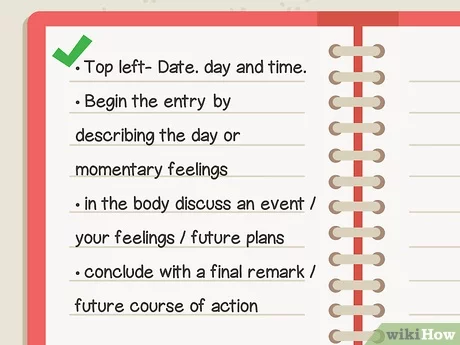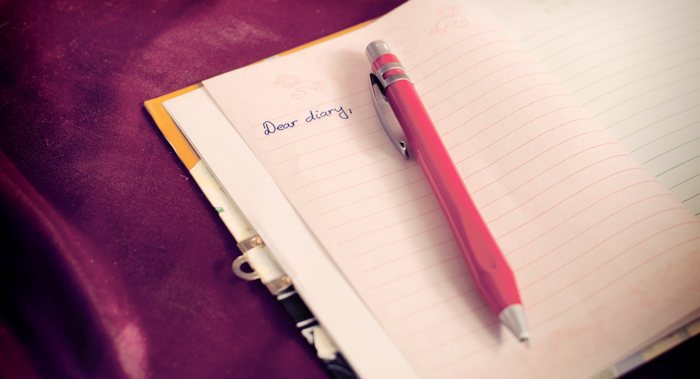A diary is a personal journal or record where individuals chronicle their thoughts, feelings, experiences, and daily activities. It serves as a private space for self-reflection and expression, capturing the writer’s unique perspective and personal journey over time. Diaries can take various forms, including handwritten notebooks, digital documents, or specialized apps designed for journaling. The content of a diary is typically subjective, providing a candid account of the writer’s emotions, events, and reflections without the expectation of being shared with others.
Write a Diary Guide and Hide it Safely
Many Tips When Starting a Diary
Embarking on the journey of starting a diary is a wonderful step towards self-discovery, self-expression, and personal growth. Here are several tips to guide you as you begin this enriching practice:

- Clarify Your Purpose: Before putting pen to paper or fingers to keyboard, consider why you want to start a diary. Are you looking for self-reflection, emotional release, goal-setting, or a combination of these? Defining your purpose helps give direction to your entries and makes the process more intentional.
- Choose the Right Medium: Decide whether you prefer a physical journal or a digital platform. The tactile experience of writing on paper can be therapeutic, while digital options offer convenience and searchability. Select the medium that aligns with your preferences.
- Find the Perfect Journal: If you opt for a physical journal, choose one that resonates with you. Whether it’s a simple notebook or a beautifully crafted journal, the aesthetic appeal can make the act of writing more enjoyable and personal.
- Start with an Introduction: Initiate your diary with an introductory entry. Share your thoughts on why you’re starting, what you hope to achieve, and any guidelines you want to set for yourself. This sets the tone for your diary-writing journey.
- Be Consistent, Not Perfect: Establishing a routine is crucial, but don’t stress about perfection. Write regularly, but it’s okay if life gets in the way sometimes. The key is to make diary writing a habit without adding unnecessary pressure.
- Write Freely and Authentically: Your diary is a judgment-free zone. Write freely about your thoughts, emotions, and experiences. Be authentic and honest with yourself; this is a space for your true self to emerge.
- Experiment with Styles: Don’t be afraid to experiment with different writing styles. Your diary is a flexible canvas – explore narratives, poems, sketches, or a combination. Discover what resonates with you and makes the writing experience enjoyable.
- Include Reflections: After documenting your daily events, take a moment to reflect. Consider your emotions, reactions, and any patterns you notice. Reflecting adds depth to your entries and fosters self-awareness.
- Set Realistic Goals: Start with achievable goals for your entries. Instead of committing to writing pages daily, consider starting with a few sentences or a paragraph. Gradually increase the length as you become more comfortable.
- Guard Your Privacy: Whether your diary is physical or digital, guard your privacy. If using a physical journal, find a secure hiding spot. For digital diaries, choose platforms with privacy features and consider using password protection.
Starting a diary is a personal and evolving journey. Let these tips guide you as you navigate the realms of self-discovery and creativity through the art of diary writing.
Keys To Effectively Writing a Journal
Effectively writing a journal is a transformative practice that nurtures self-awareness, emotional well-being, and personal growth. Here are key strategies to enhance the effectiveness of your journaling experience:
- Be Authentic: Authenticity is the cornerstone of effective journaling. Write openly and honestly about your thoughts, feelings, and experiences. Allow your journal to be a judgment-free space where you can express yourself without reservations.
- Establish Consistency: Consistency is key to reaping the full benefits of journaling. Set aside dedicated time for writing, whether it’s daily, weekly, or at another frequency that suits your lifestyle. Consistent journaling builds a habit that promotes self-reflection and introspection.
- Define Your Purpose: Clearly define why you’re keeping a journal. Are you seeking emotional release, tracking personal goals, or exploring creative expression? Understanding your purpose helps shape the content and focus of your entries.
- Experiment with Styles: Explore various writing styles to keep your journaling experience dynamic. Write narratives, reflect in poetry, create lists, or include sketches. Experimenting with different styles adds richness and diversity to your entries.
- Reflect on Your Day: Use your journal as a tool for reflection. Consider the events of your day, your reactions, and the emotions you experienced. Reflective writing enhances self-awareness and promotes a deeper understanding of your own thought processes.
- Set Goals and Intentions: Incorporate goal-setting into your journal entries. Outline short-term and long-term goals, and revisit them periodically to track your progress. Setting intentions helps create a sense of purpose and direction in your life.
- Embrace Gratitude: Include moments of gratitude in your journal. Acknowledge and document the positive aspects of your life, no matter how small. Cultivating a gratitude practice fosters a positive mindset and enhances overall well-being.
- Address Challenges: Don’t shy away from addressing challenges or setbacks in your journal. Use it as a safe space to explore your feelings, analyze obstacles, and strategize solutions. Journaling about challenges can be therapeutic and provide insights for personal growth.
Specific Writing Style for Diary
Crafting a specific writing style for your diary involves a thoughtful approach to enhance the authenticity and depth of your entries. Addressing yourself directly, using first-person pronouns, establishes an intimate connection, fostering self-awareness in your reflections. Enrich your entries with descriptive language, vividly capturing the essence of emotions and surroundings to create a more engaging narrative. Develop a ritualistic opening, such as a personalized phrase or salutation, for consistency and cohesiveness.
Experiment with a stream-of-consciousness style, allowing your thoughts to flow freely without self-censorship, capturing the raw and unfiltered nature of your stream of thoughts. Integrate dialogue, especially when recounting conversations, to infuse a conversational tone into your entries. Mix media by combining text with sketches, doodles, or images to add a visual dimension and creativity to your diary.
Capture fragments of the day rather than exhaustive narratives, jotting down snippets of conversations, fleeting emotions, or small observations for a concise yet impactful representation. Integrate reflective moments to analyze events, emotions, or personal growth, enhancing the depth of your diary as a tool for self-awareness. Develop a signature closing to symbolically conclude each entry, giving your diary a sense of continuity. Most importantly, stay true to yourself, allowing your unique voice to shine through in every entry, making your diary an authentic reflection of your inner world.
FAQS
What should I write about in my diary?
Your diary is a personal space for self-expression. Write about your thoughts, emotions, daily experiences, and reflections. There are no strict rules; focus on what resonates with you. You can explore your goals, challenges, or simply document the events of the day.
How often should I write in my diary?
The frequency of your entries is entirely up to you. Some people prefer daily reflections, while others may write weekly or as events unfold. The key is consistency. Find a rhythm that suits your lifestyle and commit to it, ensuring your diary becomes a regular part of your routine.
Should I use pen and paper or a digital platform for my diary?
The choice between traditional and digital mediums depends on personal preference. If you enjoy the tactile experience of writing with pen and paper, opt for a physical journal. If you prefer convenience and the ability to search through your entries easily, consider using a digital diary app or platform like Penzu.
How can I overcome writer’s block?
Writer’s block is natural. Experiment with writing prompts to spark inspiration. Take a break and return with a fresh perspective. Don’t worry about perfection; let your thoughts flow without judgment. Remember, your diary is a judgment-free space.
Can I include sketches or mementos in my diary?
Absolutely! Your diary is a reflection of your creativity. Include sketches, photos, or mementos that hold sentimental value. These additions can enhance your entries and provide a visual representation of your experiences. Your diary is a versatile space for self-expression; make it uniquely yours.

